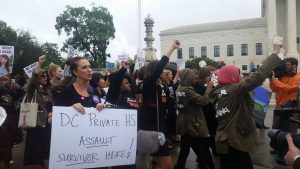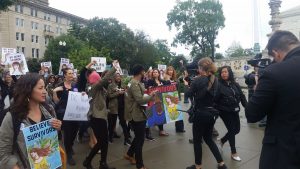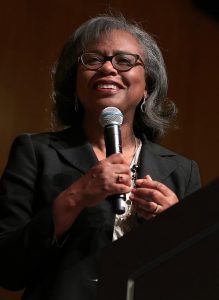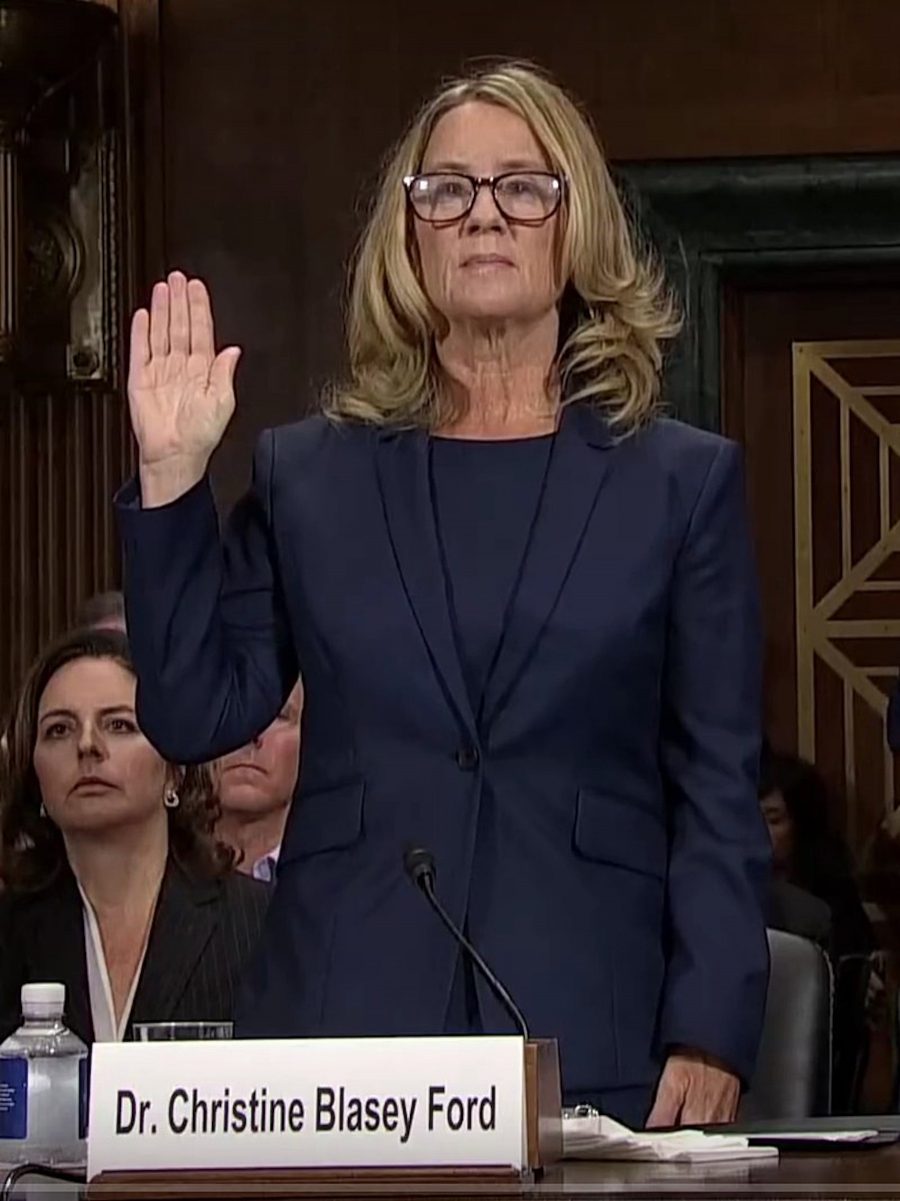Ever since the allegations against US Supreme Court Judge nominee Brett Kavanaugh started coming out, I could not stop following the story. Through this bizarre news binge, I even learned about Anita Hill’s accusations of sexual harassment in 1991 of now appointed Supreme Court Judge Clarence Thomas. It’s not like it was odd for me to follow up with a news story, but somehow this felt different. Dr. Christine Blasey Ford’s story felt like it could have happened to me — but thankfully hadn’t.
For those of you not familiar with the details, Dr. Ford has alleged that, in the summer of 1982, then 17-year-old Brett Kavanaugh tried to rape her at a party when she was only 15. Dr. Ford alleges that at this party a “stumbling drunk” Kavanaugh held her down on a bed and tried to remove her clothes while his friend Mark Judge watched. When she tried to scream, Kavanaugh put his hand over her mouth. She told the Washington Post: “I thought he might inadvertently kill me.” While this was going on, Mark Judge not only did nothing, but Ford recounts that he laughed “maniacally” along with Kavanaugh during the act. During her Senate Judiciary Committee Hearing Ford stated:
Indelible in the hippocampus is the laughter. The abraeous laughter between the two. And their having fun at my expense. They were laughing with each other. I was underneath one of them while the two laughed. Two friends having a really good time with one another.
Eventually Mark Judge toppled onto Ford and Kavanaugh and she was able to escape. The incredibly disturbing nature of this story aside, her allegations are extremely credible. Long before Kavanaugh’s nomination, she first told her husband about it during couples’ therapy in 2012 for which Ford’s therapist has notes that corroborate her story, and even her husband has stated that Ford used Kavanaugh’s last name. There is no reason other than needing to work through her trauma that Dr. Ford would have told her therapist and husband about her sexual assault.
I believe Christine Blasey Ford.
Sadly, not everyone does. And, after watching the hearings, it became clear to me that if there was not going to be justice after Dr. Ford’s incredibly credible allegations, at this point in time there would not be justice for most women survivors of sexual assault. And that is a truly heartbreaking realization.
Watching the coverage before, during, and after the trial was very hard for me, and I am not even American. But I am a woman. It’s completely incomprehensible to me how some Republican women have chosen to support Kavanaugh and not believe Ford. If I were in D.C., I certainly would have been a part of the #MeToo walkout on September 24th shouting together with the other protesters “we believe survivors”.

One of the most common questions asked around this case has been why she had not reported it earlier, which is a key reason for some people’s mistrust of Dr. Ford’s account. Sadly, there are many reasons why women don’t report sexual violence, and some took this opportunity to explain their own reasons with the hashtag #WhyIDidntReport. Women shared stories on social media ranging from nonconsensual instances to sexual assaults to gang rapes. I read a lot of these stories last week, so it wasn’t surprising that I also kept having intruding thoughts of moments in my life that had been less than consensual.
I started crying as I texted my boyfriend: “They laughed at her while they did it. How horrible is that?” referring to Ford’s assault. The thought of that is genuinely disturbing, but I could not figure out for a few days why that part of Ford’s story made me cry until I got harassed again at Alexanderplatz last week. A guy my age declared: “Du bist jetzt meine neue Freundin” (You are my new girlfriend now). The entitlement of his statement made me shake with rage. I was actually surprised by my own reaction because I get a lot of street harassment and it usually doesn’t bother me too much because I’ve gotten used to it — which is sad in its own respect. But this happened in the middle of the day at the place where I had been assaulted a year ago, and it felt like too much in that moment.
Last August a teenage boy came out of nowhere and grabbed my breast. I was completely shocked and froze while my roommate yelled at him and his friends. I think what was triggering for me about this specific part of Dr. Ford’s testimony was that my assailant had laughed as he assaulted me too. He, like Brett Kavanaugh and Mark Judge, had fun at my expense and at the violation of my bodily autonomy.
Especially after getting harassed at Alexanderplatz once again, I felt like I should contribute to the discussion, so I tweeted: “I told a male friend once about a stranger violently grabbing my boob at the subway station. His first question was #WhyIDidntReport. Because I literally didn’t know who it was. Can’t even recall his face. Trying to track him down would’ve taken more energy than getting over it.”
Even though I found it to be a stupid question when my friend asked it, he at least had good intentions. He asked it out of a sense of justice. However, we do not live in a world where women get justice for these kinds of incidents. Instead, we live in a world where we are doubted. And when we do report sexual violence, our motivations behind it are questioned. With this culture of misogyny, shaming and victim blaming in mind, how could one even ask the question about why Christine Blasey Ford didn’t report? She had been drinking when she wasn’t supposed to and was at a party with older boys. It’s not hard to imagine what she had been afraid of: She would have been disbelieved, slut-shamed and accused of trying to ruin a man’s future. In fact, it’s not very different from what she is experiencing now.

As I reacted more emotionally to multiple minor sexual harassment incidents last week, I kept thinking “at least I didn’t have a Brett Kavanaugh in high school”. There was a period when a male friend of mine hosted a lot of parties at his house and, yes, we did drink even though we weren’t supposed to. Besides perhaps some minor incidents, nothing bad ever happened to me at these parties. But I remember one party at which a boy — let’s call him John — was being particularly creepy with a female acquaintance — let’s call her Mary. I was not in the room in which it happened, but a male friend of mine told me about the incident. John — who seemed like the last person you would suspect to act this way — tried to keep Mary in a room when she clearly didn’t want to be there. When my friend happened to walk in and John kept insisting that he leave the two of them alone, my friend did not leave because he noticed that Mary felt threatened. He got John to leave her alone and thankfully nothing happened. The host of these parties never invited John over again.
I tell this story to point out that men do not have to be complicit in these situations. In fact, they can often prevent these situations from escalating. During the hearings, Dr. Ford recounted that she had made eye contact with Mark Judge twice during her attempted rape, but he did not help her. Rather, he joined in and laughed while she was being violated.
Thankfully, Mary did not get sexually assaulted that night, but I kept thinking, what if she had been? What if, instead of Mary, it was me in that room and no one had walked in? After all, John had been weirdly touchy with me during that party too — something I just brushed off as creepy but probably not a significant threat. If he had done more than just made me uncomfortable, would I have been able to tell my parents about what had happened? Or would I have been too ashamed to say anything until a couples’ therapy session decades from the incident? I can’t really give answers to these hypotheticals, but I am inclined to say that, at the very least, I would not have reported it immediately. We live in a world that doesn’t make it easy for women and girls to come forward with stories of sexual violence — especially if they were wearing something revealing, or drinking, or otherwise just weren’t the ‘perfect’ victims who were sober, ‘modestly dressed’ and remembered all of the details of their assaults. Again and again people ask questions like what the woman was wearing or whether she was drinking in order to explain why a man might have been ‘provoked’ to commit such an act. Again and again people doubt women’s motives for making accusations and worry more about the effects that these accusations might have on the lives of men rather than the trauma that survivors of sexual violence must endure for years. Hearing these cliched rape myths repeated is depressing every time. And it is depressing to see these myths are being solidified as millions of people are watching historic Supreme Court Hearings that could confirm a man who doesn’t support the verdict of Roe v. Wade.

Other than these hearings making me and countless other women relive their experiences of sexual assault and harassment, they have sadly reaffirmed a certain discourse. Most of the Democratic senators were respectful with Dr. Ford. Senator Kamala Harris even said to Ford twice: “I believe you”. Still, the hearing did contain another side in which Kavanaugh — a rich, white man — told his account of the story in an uncomposed and angry way, reiterating that he has never sexually assaulted anyone even though he loves beer, but he never drank excessively to the point where he would commit violent acts under the influence — a claim that has since been disputed by several witnesses.
Ultimately, it’s good that, as Dr. Ford asked, the committee voted in favor of having an FBI investigation which should potentially get to the bottom of this case. However, Republicans have made sure that the FBI is only given a week to complete the investigative process, which would normally take longer. And yet after three women — Dr. Ford, Deborah Ramirez and Julie Swetnick — have come forward with allegations against him, Brett Kavanaugh was still confirmed by the Senate Judiciary Committee and his nomination will be voted on in a Republican controlled Senate that is likely to appoint him a Supreme Court Judge for life soon.
If Kavanaugh actually gets the appointment, then Dr. Christine Blasey Ford will follow in the upsetting (yet courageous) legacy of Anita Hill, whose testimony in a pre-#MeToo context was not enough to get senators to vote against the man who continuously sexually harassed her. Clarence Thomas is still a Supreme Court Judge today and will be for the rest of his life. Anita Hill bravely told her story of workplace harassment only to have been insulted by people like the writer David Brock who called her “a little bit nutty and a little bit slutty”. Despite it all, Anita Hill spoke up and said during her Judiciary Committee Hearing:
It would have been more comfortable to remain silent. It took no initiative to inform anyone — I took no initiative to inform anyone. But when I was asked by a representative of this committee to report my experience, I felt that I had to tell the truth. I could not keep silent.

Similarly, Dr. Ford said in her opening statement to the committee: “I am here today not because I want to be. I am terrified. I am here because I believe it is my civic duty to tell you what happened to me while Brett Kavanaugh and I were in high school.”
Not despite of but because of the backlash they knew they would face, I am in awe of the bravery of these two women. If there is anything good we can take away from these terrible situations, it is the knowledge of their courage and their dedication to the democratic process.
Now in the midst of the #MeToo movement, things are somewhat different for Christine Blasey Ford, but not different enough. Unlike Hill, Ford was not subjected to racism because she is white and was not asked ridiculous questions like “are you a woman scorned?” And yet she, like Hill, is doubted by millions when she speaks out about some of her most horrible experiences; she is called a liar while a man who calls birth control pills “abortion inducing drugs” looks forward to potentially being appointed to the most powerful court of the US.
In his opening statement to the Senate Judiciary Committee, Brett Kavanaugh, offended at being accused and claiming that he is having his life ruined, said: “The consequences will extend long past my nomination. The consequences will be with us for decades.”
I am afraid that he is right. The damage of his testimony will not be repaired easily. Even if the FBI investigation proves his guilt and on the off chance that he doesn’t get the lifetime appointment to the Supreme Court, Kavanaugh and his supporters have made it even more difficult than it already is for survivors to come forward. These past few weeks have made survivors relive their traumas. Many even partook in political work to help stop the nomination while experiencing this pain.
It’s not like we are about to stop fighting against misogyny and for justice for survivors of sexual violence, but this sure is one hard fight we may not even win.

